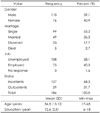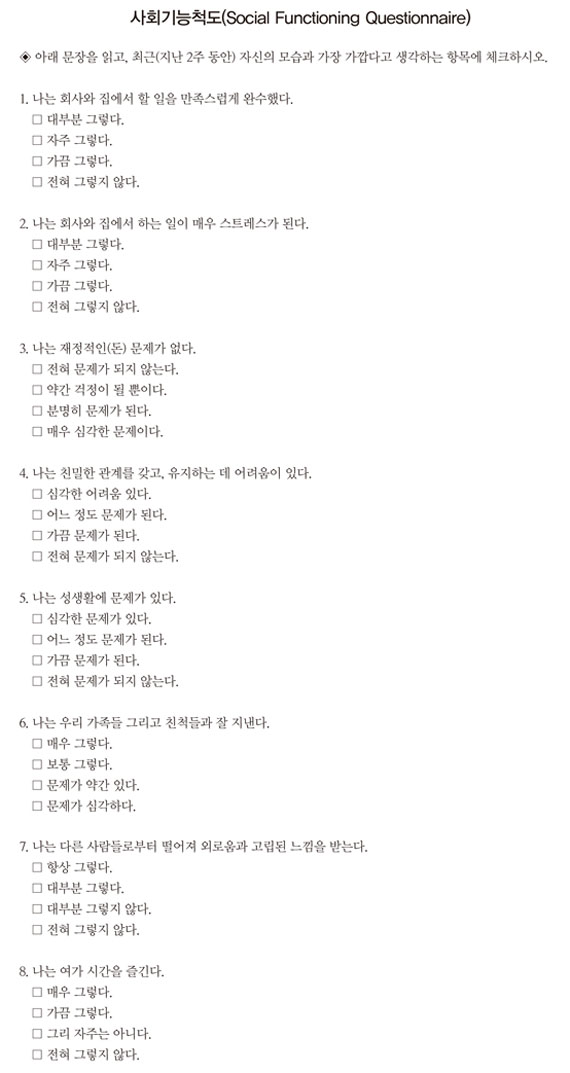Abstract
Objectives
The aims of this study were to examine validity and reliability of the Korean version of the Social Function Questionnaire (SFQ) and evaluated social function with SFQ in patients with personality disorder.
Methods
The SFQ was administered to 186 psychiatric patients (155 patients with personality disorder and 31 patients without personality disorder), and 22 healthy men were recruited to examine the test-retest reliability of SFQ. The severity of personality disorders was determined using the proposed the International Classification of Diseases (ICD)-11th revision (ICD-11) personality disorders. All participants completed the NEO-Five Factor Inventory, Beck Depression Inventory, and Spielberger State and Trait Anxiety Inventory to examine the convergent validity of SFQ.
Results
The Korean version of the SFQ showed good internal consistency (Cronbach's alpha=0.811) and test-retest reliability (r=0.746). Patients with personality disorder had more social dysfunction than those without personality disorder. A graded increase in social dysfunction was observed with increasing severity of personality disorder. Social dysfunction showed a strong linear relationship with the 5 factor model.
Figures and Tables
Fig. 1
The diagnostic flow diagram. PAS : Personality Assessment Schedule, ICD-10 : 10th revision of the International Classification of Diseases, WHO : World Health Organization.

Table 2
The distribution of participants based on ICD-10 mental disorders and personality disorders (n=186)

Table 4
The mean scores of SFQ by severity of personality disorders in patients with personality disorder (n=155)

Data are shown as mean (standard deviation). Post-hoc Tukey tests show that the SFQ scores were significantly different between personality difficulty and severe personality disorder. The correlation coefficient between SFQ and the severity of personality disorder is Spearman's rho=0.262 (p<0.001). SFQ : Social Functioning Questionnaire
References
1. World Health Organization. The ICD-10 classification of mental and behavioural disorders: clinical descriptions and diagnostic guidelines. Geneva: World Health Organization;1992.
2. Reed GM, Mendonça Correia J, Esparza P, Saxena S, Maj M. The WPA-WHO global survey of psychiatrists' attitudes towards mental disorders classification. World Psychiatry. 2011; 10:118–131.

3. Tyrer P, Crawford M, Mulder R. ICD-11 Working Group for the Revision of Classification of Personality Disorders. Reclassifying personality disorders. Lancet. 2011; 377:1814–1815.

5. Widiger TA. The DSM-III-R categorical personality disorder diagnoses: a critique and an alternative. Psychol Inq. 1993; 4:75–90.

6. Livesley WJ, Schroeder ML, Jackson DN, Jang KL. Categorical distinctions in the study of personality disorder: implications for classification. J Abnorm Psychol. 1994; 103:6–17.

7. Bernstein DP, Iscan C, Maser J. Boards of Directors of the Association for Research in Personality Disorders. International Society for the Study of Personality Disorders. Opinions of personality disorder experts regarding the DSM-IV personality disorders classification system. J Pers Disord. 2007; 21:536–551.

8. Roblesa R, Fresánb A, Evansb SC, Lovellc AM, Medina-Moraa ME, Majd M, et al. Problematic, absent and stigmatizing diagnoses in current mental disorders classifications: results from the WHO-WPA and WHO-IUPsyS Global Surveys. Int J Clin Health Psychol. 2014; 14:165–177.

9. Tyrer P, Crawford M, Mulder R, Blashfield R, Farnam A, Fossati A, et al. The rationale for the reclassification of personality disorder in the 11th revision of the International Classification of Diseases (ICD-11). Personal Ment Health. 2011; 5:246–259.

10. Tyrer P, Crawford M, Sanatinia R, Tyrer H, Cooper S, Muller-Pollard C, et al. Preliminary studies of the ICD-11 classification of personality disorder in practice. Personal Ment Health. 2014; 8:254–263.

11. Kim YR, Tyrer P, Lee HS, Kim SG, Hwang ST, Lee GY, et al. Preliminary field trial of a putative research algorithm for diagnosing ICD-11 personality disorders in psychiatric patients: 2. Proposed trait domains. Personal Ment Health. 2015; 9:298–307.

12. Kim YR, Blashfield R, Tyrer P, Hwang ST, Lee HS. Field trial of a putative research algorithm for diagnosing ICD-11 personality disorders in psychiatric patients: 1. Severity of personality disturbance. Personal Ment Health. 2014; 8:67–78.

13. Tyrer P, Nur U, Crawford M, Karlsen S, McLean C, Rao B, et al. The Social Functioning Questionnaire: a rapid and robust measure of perceived functioning. Int J Soc Psychiatry. 2005; 51:265–275.

14. Kager A, Lang A, Berghofer G, Henkel H, Steiner E, Schmitz M, et al. Family dynamics, social functioning, and quality of life in psychiatric patients. Eur J Psychiatry. 2000; 14:161–170.
15. Tyrer PJ, Casey PR. Social function in psychiatry: the hidden axis of classification exposed. Wrightson, DC: Wrightson Biomedical Pub. Limited;1993.
16. Casey PR, Tyrer PJ, Platt S. The relationship between social functioning and psychiatric symptomatology in primary care. Soc Psychiatry. 1985; 20:5–9.

17. Leader JB, Klein DN. Social adjustment in dysthymia, double depression and episodic major depression. J Affect Disord. 1996; 37:91–101.

18. Casey PR, Tyrer PJ. Personality, functioning and symptomatology. J Psychiatr Res. 1986; 20:363–374.

19. Nur U, Tyrer P, Merson S, Johnson T. Social function, clinical symptoms and personality disturbance. Ir J Psychol Med. 2003; 21:18–21.

20. American Psychiatric Association. Diagnostic and Statistical Manual of Mental Disorders (DSM-III-R). 3rd ed, revised. Washington, DC: American Psychiatric Association;1987.
21. Hilsenroth MJ, Ackerman SJ, Blagys MD, Baumann BD, Baity MR, Smith SR, et al. Reliability and validity of DSM-IV axis V. Am J Psychiatry. 2000; 157:1858–1863.

22. Goldman HH, Skodol AE, Lave TR. Revising axis V for DSM-IV: a review of measures of social functioning. Am J Psychiatry. 1992; 149:1148–1156.

23. Nur U, Tyrer P, Merson S, Johnson T. Relationship between clinical symptoms, personality disturbance, and social function: a statistical enquiry. Irish J Psychol Med. 2004; 21:19–22.
24. Ware JE Jr, Sherbourne CD. The MOS 36-item short-form health survey (SF-36). I. Conceptual framework and item selection. Med Care. 1992; 30:473–483.
25. Weissman MM, Bothwell S. Assessment of social adjustment by patient self-report. Arch Gen Psychiatry. 1976; 33:1111–1115.

26. Tyrer P, Seivewright H, Simmonds S, Johnson T. Prospective studies of cothymia (mixed anxiety-depression): how do they inform clinical practice? Eur Arch Psychiatry Clin Neurosci. 2001; 251:Suppl 2. II53–II56.

27. Tyrer P, Alexander J. Classification of personality disorder. Br J Psychiatry. 1979; 135:163–167.

28. Tyrer P. Personality Assessment Schedule for ICD-11. Home Office. 2015.
29. Costa PT, McCrae RR. Revised NEO Personality Inventory (NEOPI-R) and NEO Five-Factor Inventory (NEO-FFI) professional manual. Odessa: Psychological Assessment Resources;1992.
30. Beck AT, Ward CH, Mendelson M, Mock J, Erbaugh J. An inventory for measuring depression. Arch Gen Psychiatry. 1961; 4:561–571.

31. Spielberger CD. Manual for the State-Trait Anxiety Inventory: STAI (Form Y). Palo Alto: Consulting Psychologists Press;1983.
32. Remington M, Tyrer P. The social functioning schedule-a brief semi-structured interview. Soc Psychiatry. 1979; 14:151–157.

33. Tyrera P, Mersona S, Harrison-Reada P, Lyncha S, Birketta P, Onyetta S. A pilot study of the effects of early intervention on clinical symptoms and social functioning in psychiatric emergencies. Ir J Psychol Med. 1990; 7:132–134.

34. Tyrer P, Strauss J, Cicchetti D. Temporal reliability of personality in psychiatric patients. Psychol Med. 1983; 13:393–398.

35. Ahn CK, Chae JH. Standardization of the Korean version of the Revised NEO Personality Inventory. Korean J Couns Psychother. 1997; 9:443–447.
36. Hahn HM, Yum TH, Shin YW, Kim KH, Yoon DJ, Chung KJ. A standardization study of Beck Depression Inventory in Korea. J Korean Neuropsychiatr Assoc. 1986; 25:487–500.
37. Hahn DW, Lee CH, Chon KK. Korean adaptation of Spielberger's STAI (K-STAI). Korean J Health Psychol. 1996; 1:1–14.
38. American Psychiatric Association. Diagnostic and Statistical Manual of Mental Disorders. 5th ed. Arlington: American Psychiatric Association;2013.
39. Tyrer P, Reed GM, Crawford MJ. Classification, assessment, prevalence, and effect of personality disorder. Lancet. 2015; 385:717–726.

40. Bastiaansen L, De Fruyt F, Rossi G, Schotte C, Hofmans J. Personality disorder dysfunction versus traits: structural and conceptual issues. Personal Disord. 2013; 4:293–303.





 PDF
PDF ePub
ePub Citation
Citation Print
Print






 XML Download
XML Download